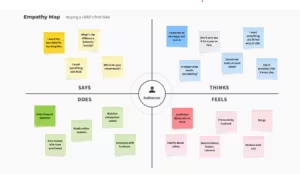
If you own or plan to start a small businesses, conducting market research is essential for informed decision-making. This process involves understanding your market, customers, and competitors, which is crucial for your business’s success. Let’s explore how market research can enhance your business planning, product development, and competitive edge.
What is Market Research for Small Businesses?
There are two primary types of market research strategies:
Quantitative Research: This approach focuses on collecting measurable data, such as numbers, survey responses, and statistics. It allows for objective analysis of the information gathered.
Qualitative Research: In contrast, this method relies on subjective data collected through focus groups, interviews, and social media interactions with customers.
For a comprehensive understanding of your customers’ needs and the overall market, it’s best to conduct both quantitative and qualitative research for your small business.
Reasons for a Small Businesses to Conduct Market Research
Small business owners can gain significant advantages from effective market research:
- Reduce Risk: Research helps you understand customers and competitors, allowing for more informed decisions and reduced risk in investments.
- Identify Trends: Staying updated on current and emerging trends lets you adapt your products or services to meet customer demands.
- Test Product Viability: Engaging with customers through research helps assess whether new product ideas are worth pursuing.
- Tailor Marketing: Market research reveals which media sources your target audience engages with, guiding your advertising choices.
- Secure Funding: Investors prefer data-backed insights over speculation, making thorough market research essential for attracting outside investments.
6 Tips for Conducting Effective Market Research for Small Businesses
It’s not enough to simply conduct market research; it’s essential to do it effectively to uncover valuable insights.
1. Define Your Goals
Before diving in, take the time to clarify your objectives. Outline the questions you want to answer with your data, as this will streamline the process and provide clear direction. Consider questions like:
- Who are my customers?
- What is my target demographic?
- How large is my market?
- How much are customers willing to spend?
- What do customers need and want?
- Who are my main competitors?
- What data collection methods will yield these answers?
2. Create a Budget
Market research can be both time-consuming and costly, especially if you plan to conduct focus groups or extensive studies. However, affordable alternatives exist, such as gathering opinions on platforms like Quora or Reddit. If you have an email list, Facebook group, or Instagram community, consider using surveys to gather feedback.
Regardless of your approach, it’s crucial to set a budget beforehand. Effective market research should provide insights into your customers, not lead to overspending that hinders your ability to hire staff or develop new products.
3. Identify Your Target Customer
Understanding your target customer is vital. Gather data about their age, location, and the types of products or services they seek, and then create a detailed buyer persona.
This persona can include a name, hobbies, pain points, and age. Remember, marketing strategies for millennials will differ from those for Gen Z. Use this persona to guide your decisions and explore ways to address your customers’ unmet needs.
4. Research Your Competition
Investigating your competitors is an excellent way to understand what appeals to customers. Identify companies with similar offerings and perform a SWOT analysis—assessing strengths, weaknesses, opportunities, and threats.
Examine your competitors’ social media, marketing strategies, pricing, and customer reviews. Use these insights to enhance your own offerings, whether through competitive pricing, superior customer service, or other improvements.
5. Collect Multiple Types of Data
When conducting your research, gather a variety of data using multiple collection methods. Here are some approaches to consider:
Types of Research to Explore
- Primary Research: Distribute surveys and questionnaires to potential customers or your email list. Organize your findings in a spreadsheet. If you’re unfamiliar with spreadsheets, now is a great time to learn Excel.
- Secondary Research: Utilize existing data from academic studies, reports, and online resources. There’s no need to reinvent the wheel when you can leverage already published data that can inform your decisions.
- Online Tools: Implement analytics-tracking software, establish social media profiles, and perform keyword research to gather insights.
- Focus Groups: If your budget permits, conduct focus groups for direct feedback on your products or services.
- Customer Feedback: Actively seek feedback from your current customers to gain real-time insights into their experiences with your business.
Regularly Update Your Research
Lastly, make it a priority to regularly update your data. The market evolves quickly, and various factors can influence your business’s success. After conducting your initial research, schedule periodic refreshes. Monitor which products or services are performing well and continuously review customer feedback to identify areas for improvement.
While running a small business can be challenging, remaining open to new ideas and staying informed about your industry will help ensure continued growth for years to come.





One response to “6 Tips for Small Businesses to Conduct Market Research”
[…] face the ongoing challenge of remaining relevant to younger consumers. For Gen Z, traditional marketing strategies often miss the mark. This generation is as brand-savvy as top marketers, crafting online personas […]